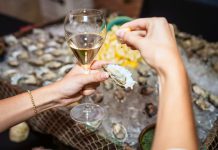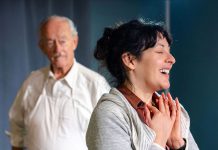At the Commonwealth Club in San Francisco last Tuesday, I chaired a program on Food Addiction. The panel included doctors, clinicians, and scientists from all over the country and Canada. It was an incredible event and everyone learned so much; the physical elements of food addiction such as dopamine release, (ah, pleasure…) the correlation of fats/salt and sugar to food addiction, and certainly the psychology behind food addiction were so interesting. Then there are policy implications by acknowledging food addiction as ‘real’ –a program in itself.
Dr. Elissa Epel from UCSF suggested that food addiction begins in the womb when brains are being ‘calibrated.’ Dr. Vera Tarman from a treatment center in Toronto, Canada suggested strongly that a paradigm shift needed to happen in treatment centers to assist people with addictions to drugs/sex/gambling and food, incorporating nutrition into treatment. Also, the problem with not recognizing food addiction as a real addiction is that it makes it difficult to treat.
Dr. Robert Lustig, head of pediatrics from UCSF, brought up an op-ed he had just submitted to The Atlantic on ‘Happiness and Pleasure’. This was my take home point. Some people confuse the two and they are, he suggests, opposite ends of the pole.
What is the difference? Pleasure is a momentary feeling that comes from something external—the gratification of the senses; a bowl of ice cream, sports, sex, new ‘things’ and so on. Pleasurable experiences can give us momentary feelings of happiness, but this happiness does not last long because it is dependent upon external events and experiences. We have to keep on having ‘more’ in order to feel pleasure. As a result, many people become addicted to these external experiences, needing more and more to feel a short-lived feeling of happiness. Remember when kids would ‘save the best for last?’ Delayed gratification is, as Dr. Lustig states, “so 20th century.” We want the good stuff and we want it now. This need for pleasure—and more of it—hasn’t been good for our collective waistlines or our souls.
Happiness is more a state of mind, a state of being. The ties that bind are happiness: family, community, and doing something to make the world a better place. It doesn’t have to be a grand gesture. Raising a healthy and kind child, taking care of an elder, or doing work that makes a positive difference in someone’s life are all sources of true happiness. A sense of closeness and gratitude are deeply satisfying and profound happiness can be the result.
To put this in a food-related context, take your portion of happiness with pleasure on the side.
Try this recipe. You’ll enjoy the taste (pleasure) and you’ll be happy knowing that you’re doing something good for your body when you eat nutritious food. Healthy bodies help create happiness. Best of both worlds.
Red Snapper Vera Cruz
Serves 4
2 pounds red snapper or other firm white fish
1/2 teaspoon sea salt
1/4 cup fresh lime juice
1 medium yellow onion, thinly sliced
1 medium red bell pepper, thinly sliced
2 cups tomatoes, diced. About 2 large tomatoes
1 4-ounce can green chilies, mild or hot, chopped
1 tablespoon capers, drained
1/2 cup cilantro, chopped
Wash fish, pat dry, and place in a glass bowl. Lightly salt and pour the lime juice evenly over the fillets. Cover and refrigerate for at least 1 hour. Sauté onions in a skillet over medium heat, covered, until tender, about 10 minutes.
If necessary add a tablespoon of water to prevent scorching. Add half the red peppers, all of the tomatoes, chilies and capers. Cook, covered, for about 10 minutes. There will be liquid in the bottom of the pan. Add the fish and cook, uncovered, for about 5 minutes on each side. Sprinkle with cilantro and serve over quinoa or brown rice.
If you are a vegetarian, skip the fish and add 2 cups of cooked black beans instead.
During the month of April, participants in Patty’s ‘Zest’ program will be led by Patty and staff in a one month cleanse. It’s a slow and easy process and you’ll arrive at the end of April feeling so wonderful. Join us! http://pattyjames.com/home/services/
Patty is the co-chair of The Health and Medicine Member-Led Forum at The Commonwealth Club and was chair and moderator of The Food Addiction Program. Here is the link to the web site to listen for the Podcast, coming soon: www.commonwealthclub.org/events/2012-
02-28/food-addiction
Patty’s passion is assisting you to obtain or maintain your good health. Patty has her master’s degree in holistic nutrition and is a certified natural chef. Patty James, Vital Health Educator and Nutrition Coach.
Founder of the first certified organic cooking school and nutrition center in the country. Visit: www.pattyjames.com, or email: pa***@********es.com.
P.O. Box 1915, Sebastopol, CA 95473.








